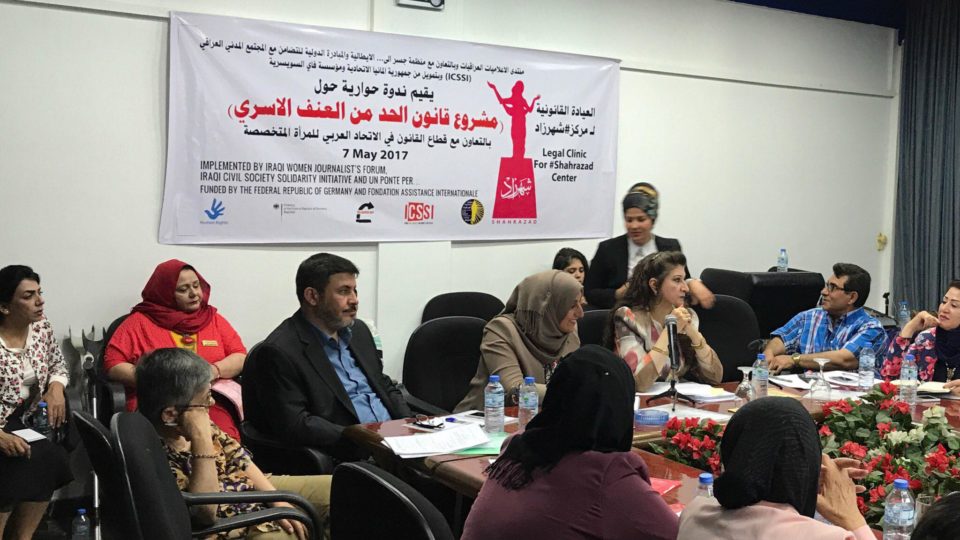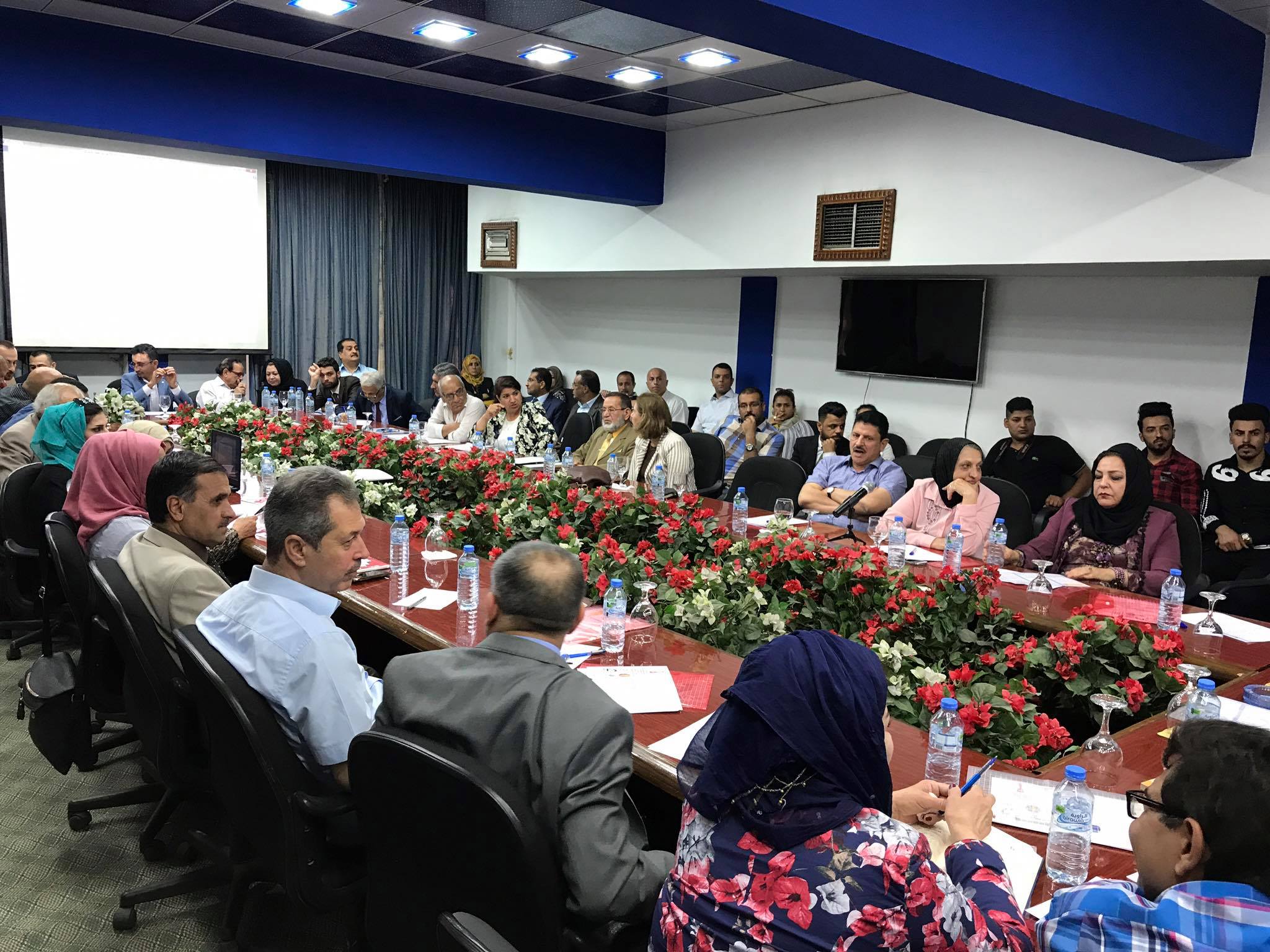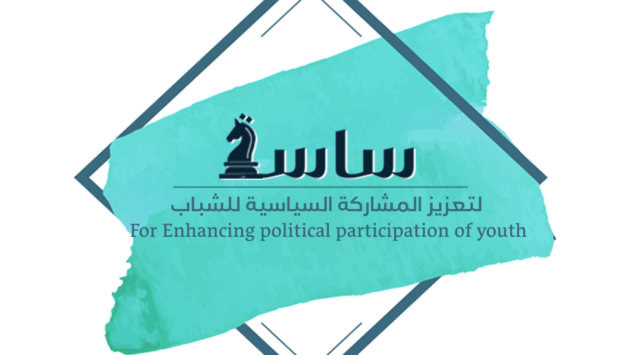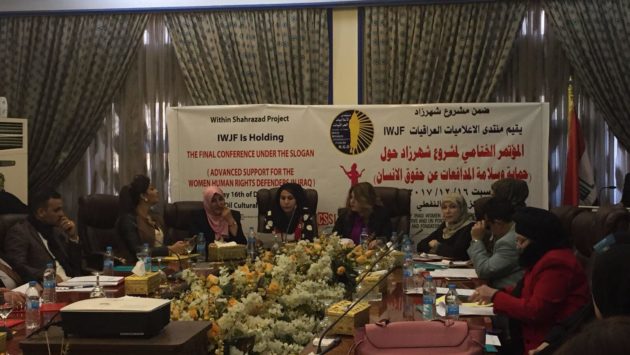Anti-Domestic Violence Law, Shahrazad Seminar in Baghdad
In the forefront of the activities of Shahrazad project in its second season, the Iraqi Women Journalist Forum (IWJF) organize in cooperation with the Arab Union for Specialized Women a seminar to discuss “the draft law on the reduction of domestic violence” on May 7th in Baghdad.
Rajaa Abd Ali, the legal advisor of Shahrazad Center opened the first session explaining the work of the legal clinic that is specialized in providing legal aid and advice to Women Human Rights Defenders in Iraq, and aims to improve the working environment and safety of WHRDs in their different fields and groups. This legal clinic receives women human rights defenders for the second year in a row after the success achieved during the first year of the Shahrazad project.
Mrs. Nibras Al Mamouri, President of the Iraqi Women Journalist Forum have also contributed in presenting a brief summary of the Shahrazad project in its second year with IWJF, in addition to the overall work and achievements of the IWJF during the past months.
Mr. Montasser Al-Eidani, Head of the Hawkamah Center for Public Policy presented a paper entitled “Missing in the democratic transition: – Policies to confront domestic violence”, which discussed the most important political, economic and cultural factors in parallel. Al-Edani pointed to the interdependence between the effectiveness of women’s political representation and the creation of legislation to better deal with cases of domestic violence. For example, governments with large numbers of women already support their rights, and this is more likely to be supported through legislative actions related to key issues such as domestic violence.
Eidani also added that the United Nations reports concluded that the overall macroeconomic situation in the country is closely linked to domestic violence rates, as the economically more developed countries have lower rates of domestic violence, as was evident in the UNICEF report in 2000, And the annual report of the United Nations Women’s Fund for 2011-2012, which included a study on the economic causes of domestic violence, noting that low levels of education and limited economic opportunities for women are associated with high rates of domestic violence.
On the other hand, the UNICEF report of 2000 and Kudo Bob of 2010 considered religion as a particularly important cultural factor that affects both domestic violence and the effectiveness of legislation. The UNICEF report does not include details of religions associated with high rates of domestic violence, but clearly indicates that when religion is used to suppress women, domestic violence rates will become higher.
Dr. Bushra Al-Obaidi, Head of the Law Sector of the Arab Union for Specialized Women in Iraq, presented a study entitled “Domestic Violence Crimes under the Iraqi Penal Code”. She discussed a number of legal legislations that are currently under discussion in the parliament. Al-Obaidi identified set of texts that should be amended, in addition to proposals to include other texts, in line with the need to revise the legislation and laws and taking into account the social change taking place in present.
While the activist Hana Edwar of Al-Amal organization, talked about the role of civil society and organizations working on this law in building bonds of communication and open channels for joint action with lawmakers to push them to seriousness in the adoption of the law.
Ms. Edwar also mentioned the workshop that was held recently in Erbil and was attended by number of parliamentarians and specialized judges, in addition to women activists. The most important result of this workshop was the attendance and participation of the chairman of the Awqaf Committee, as this committee was one of the most prominent objectors to this law, but after a series of negotiations and discussions, an understanding and an appropriate agreement were reached in the presence of the Legal Committee, the Service Committee and the Human Rights Committee.
The most prominent amendments to this law, is to change its name to the (Fighting domestic violence), after the members of the parliamentary committees concerned insist on the word protection, as this name is consistent with what is stated in the law: “The purpose of this law is to fight the crime of domestic violence, to prevent and limit its spread, to provide protection for the victims of the said crime, to provide them with the necessary care, to rehabilitate them, to punish the perpetrators and to seek family reconciliation”.
This law represents an important shift in the nature of family relations. The media plays an important role in raising awareness of this law as well as the role of civil society organizations.
Many interventions were received by the attendees during the seminar on the aggravation of the crises resulting from domestic violence, and the serious need to coordinate the social and governmental efforts to promote the status of the family, which constitute the core of society.





